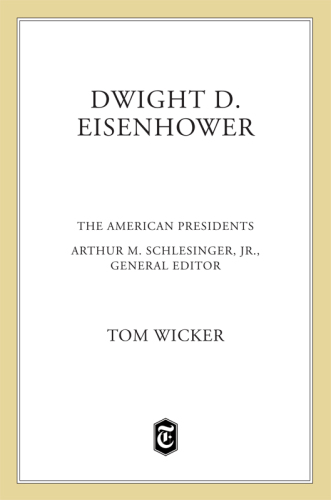
Dwight D. Eisenhower
The American Presidents Series: The 34th President, 1953-1961
فرمت کتاب
ebook
تاریخ انتشار
2014
نویسنده
Arthur M. Schlesinger, Jr.ناشر
Henry Holt and Co.شابک
9781466871809
کتاب های مرتبط
- اطلاعات
- نقد و بررسی
- دیدگاه کاربران
نقد و بررسی

August 26, 2002
The latest in the American Presidents series of brief biographies (edited by Arthur Schlesinger Jr.), journalist Wicker's chronicle of Eisenhower offers a solid account, plus a unique personal view, of the much-loved and maligned politician. Wicker (One of Us: Richard Nixon and the American Dream), who covered politics for the New York Times
for 30 years, spent a week with Eisenhower in 1962. Wicker had been a left-leaning Stevenson supporter and critic of Eisenhower's policies in the 1950s, but he found himself entranced by the ex-president and by the end of the week became a lifelong booster of Eisenhower the man, if not Eisenhower the president. Wicker says he has tried to factor out his personal fondness for Eisenhower while composing this biography, and he does manage a lively evenhandedness—not an oxymoron in this circumstance—in weighing the accomplishments and pitfalls of his administration. Only a few pages are devoted to his first 62 years on earth—the real beginning is Eisenhower's 1952 presidential campaign. A fine introduction to 1950s political history, the biography covers the domestic and international crises that occurred on Eisenhower's watch, including the Supreme Court's decision to racially integrate public schools, the poisonous influence of Sen. Joe McCarthy, tensions with the Soviet Union and the threat of nuclear war. Thanks to Wicker's limber prose (his talents as an oft-published novelist are on display), careful research and personal touch, the learning is easy.

October 1, 2002
Another in the "American Presidents" series edited by Arthur Schlesinger Jr., this brief review of the presidency of Dwight D. Eisenhower by one of the nation's most respected journalists is a valuable addition to the literature of the administration and its times. While necessarily cursory owing to the page limitations imposed by the series, this work nonetheless captures the key events of the Eisenhower presidency in a way that is highly accessible and intellectualy compelling. Wicker examines aspects of Ike's administration with an eye not only to the 1950s, but to our own era as well. This is especially evident in his examination of the roots of "executive privilege," a concept first used by Eisenhower and of vital importance to the presidency today, and of Ike's use of covert actions around the globe. Wicker (One of Us: Richard Nixon and the American Dream) concludes that Eisenhower was a great man, but not necessarily a great president. He does, however, give Ike rather high marks for his accomplishments while calling him to task for his failings (e.g., his mild response to McCarthy and his failure to exercise moral leadership in desegregation). This is one of the finest single-volume treatments of the Eisenhower presidency available. Michael A. Genovese, Loyola Marymount Univ., Los Angeles
Copyright 2002 Library Journal, LLC Used with permission.

October 15, 2002
The 1950s? The cold war, the Edsel, and Ike, of course. Without a doubt, Dwight Eisenhower put his stamp on the era of poodle skirts and nascent rock 'n' roll. In another new offering in this publisher's American Presidents series of concise and helpful biographies, Wicker, a noted political commentator and book author, takes a new look at the man who emerged from World War II as a hero of consequential proportions. He finds that Eisenhower was "one of the best-loved presidents of the century." The majority of Americans believed at the time that he kept the Soviet Union in check and the economy well afloat. But Wicker also finds aspects of the Eisenhower presidency to question, including his aloof stance toward school desegregation and McCarthyism--"at the expense of opportunities to provide moral leadership to a nation badly in need of it." Wicker concludes that Eisenhower was "a great man--but not quite a great president."(Reprinted with permission of Booklist, copyright 2002, American Library Association.)

























دیدگاه کاربران